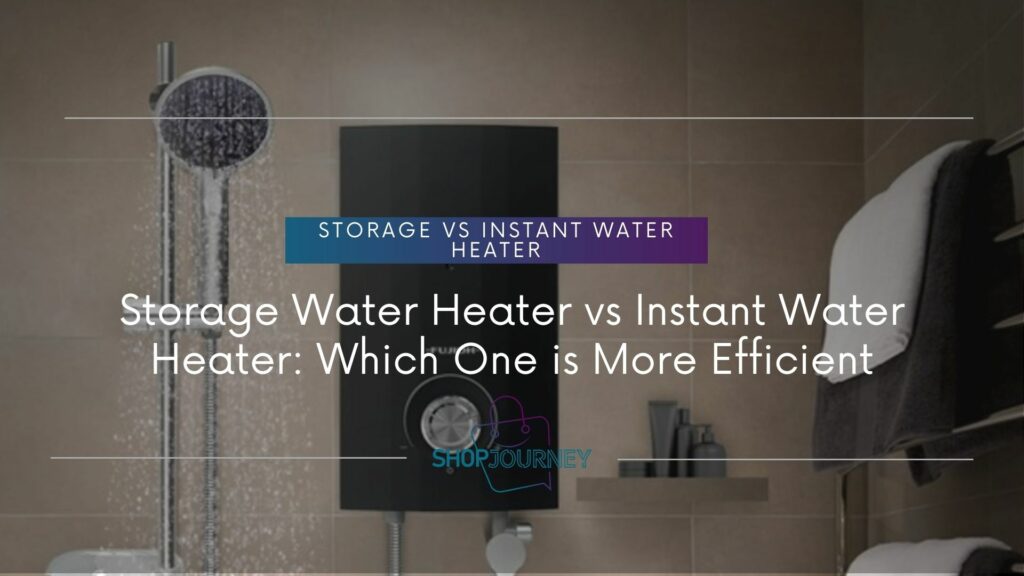Storage water heaters and instant water heaters are two common options for providing hot water in households. While both serve the same purpose, they differ in functionality, energy-efficiency, and cost-effectiveness. Storage water heaters store hot water in a tank, while instant water heaters heat water on demand without the need for a storage tank.
What Is a Storage Water Heater?
A storage water heater, also known as a conventional storage tank water heater, is the most common type of water heater used in households. It consists of a large insulated tank that stores and heats water. These tanks can range in capacity from 20 to 120 gallons, with the most common size being 40 to 50 gallons.
The insulation of the tank is an important factor in reducing standby heat loss, which occurs when heat escapes from the tank and the water inside cools down. This is because the tank is constantly heating the water to maintain a constant temperature, even when hot water is not being used.
Due to the constant heating, storage water heaters are known to consume more energy than instant water heaters. However, they are still a popular choice for households with higher hot water demands, as they can provide a large amount of hot water at once.
Installation of a storage water heater is more complex than that of an instant water heater, as it requires a large insulated tank and pipes to connect to the water supply. The installation cost of a storage water heater can also be higher than that of an instant water heater.
Overall, storage water heaters are a reliable and cost-effective option for households with a higher demand for hot water.
What Is an Instant Water Heater?
An instant water heater, also known as a tankless water heater or instantaneous water heater, is a type of water heater that provides hot water on demand. Unlike storage water heaters, which store hot water in a tank until it is needed, instant water heaters heat water as it flows through the unit, providing hot water only when it is needed.
Instant water heaters use a heat exchanger to heat water as it flows through the unit. The heat exchanger is typically powered by electricity or gas, and heats the water to the desired temperature as it flows through the unit. Because instant water heaters only heat water when it is needed, they are generally more energy efficient than storage water heaters.
One of the main advantages of an instant water heater is that it provides hot water on demand, eliminating the need for a storage tank. This can be particularly beneficial for households with limited space, as instant water heaters are typically smaller and more compact than storage water heaters. Additionally, because instant water heaters do not store hot water, there is no risk of the tank leaking or rupturing, which can be a common problem with storage water heaters.
However, there are also some disadvantages to instant water heaters. One of the main drawbacks is that they can have a higher initial cost than storage water heaters. Additionally, because instant water heaters provide hot water on demand, they may not be able to keep up with high demand for hot water, such as when multiple people are showering at the same time. The flow rate of an instant water heater can also be limited, which may be a concern for households that require a high volume of hot water.
Overall, instant water heaters can be a good choice for households that require hot water on demand and are looking for a more energy efficient alternative to storage water heaters. However, it is important to weigh the advantages and disadvantages of both types of water heaters before making a decision.
Storage Water Heater vs Instant Water Heater
When it comes to choosing between a storage water heater and an instant water heater, there are several factors to consider. One of the most significant factors is the initial cost. Storage water heaters are more affordable than instant water heaters, but they are not as energy-efficient.
Energy Efficiency
Instant water heaters are more energy-efficient because they only heat water when it is needed, whereas storage water heaters keep a large tank of water heated at all times, resulting in standby heat loss. However, instant water heaters are more expensive to operate than storage water heaters because they require a higher amount of electricity or gas to heat the water quickly.
Heating Time
Another factor to consider is the time needed to heat up the water. Instant water heaters provide hot water on demand, while storage water heaters take time to heat up the water in the tank. If you need a steady supply of hot water throughout the day, a storage water heater may be a better option.
Longevity
In terms of longevity, storage water heaters tend to last longer than instant water heaters. Storage water heaters have a life expectancy of around 10-15 years, while instant water heaters have a life expectancy of around 8-12 years.
Fuel Source Considerations
When it comes to fuel source, storage water heaters can be powered by gas or electricity, while instant water heaters are typically electric. This means that if you have a gas line in your home, a storage water heater may be a more cost-effective option.
Capacity
In terms of capacity, storage water heaters have a larger capacity than instant water heaters. This makes them a better option for whole-house use, where multiple people are using hot water at the same time.
Overall, both storage water heaters and instant water heaters have their pros and cons. It is important to consider factors such as initial cost, operating costs, efficiency, and capacity when choosing between the two.
Summary
When it comes to choosing between a storage water heater and an instant water heater, it’s essential to consider several factors, such as purchase price, warranty, tank model, performance, and energy savings. Here is a table summarizing the similarities and differences between the two types of water heaters:
| Feature | Storage Water Heater | Instant Water Heater |
| Purchase Price | Usually less expensive | More expensive |
| Warranty | Typically 6 to 12 years | Usually 2 to 5 years |
| Tank Model | Large and bulky | Compact and space-saving |
| Performance | Limited hot water supply | Unlimited hot water supply |
| Energy Savings | Less energy-efficient | More energy-efficient |
Both storage water heaters and instant water heaters have their pros and cons. Storage water heaters are usually less expensive and have longer warranties, but they are large and bulky and have limited hot water supply. On the other hand, instant water heaters are more expensive and have shorter warranties, but are compact and space-saving and have an unlimited hot water supply.
When it comes to energy savings, instant water heaters are more energy-efficient than storage water heaters, as they only heat water as needed, which can result in lower energy bills. However, the initial purchase price of an instant water heater is higher than that of a storage water heater, making it a more significant investment upfront.
Overall, the choice between a storage water heater and an instant water heater depends on individual needs and preferences. It’s essential to consider the features and benefits of each type of water heater before making a final decision.
Product Recommendations
CENTON Multipoint Storage Water Heater – Neptune Series (30 & 50 Liters)
CENTON Multipoint Storage Water Heater – Neptune Series (30 & 50 Liters) is a new generation storage water heater that comes with Blue Diamond Enamel-coated tank technology. This technology provides a storage water heater with longer lifespan, improved leak resistance, and better heat insulation, compared to conventional storage water heaters.
Pros:
- Longer lifespan
- Improved leak resistance
- Better heat insulation
- Blue Diamond Enamel-coated tank technology
- High strength and durable body material
- CFC-free insulation
- Enamelled inlet/outlet
- Easy to install
- Comes in 30 and 50 liters capacity
Cons:
- Takes up more space than instant water heaters
- Takes longer to heat up water than instant water heaters
- Uses more electricity than instant water heaters
Specifications:
- Model: Neptune Series
- Capacity: 30L, 50L
- Body Material: SPCC or Cold Rolled Steel
- Tank Coating: Blue Diamond Enamel
- Insulation: CFC-free
- Inlet/Outlet: Enamelled
- Power Consumption: 1500W
- Voltage: 240V
- Frequency: 50Hz
- Warranty: 5 years on tank, 1 year on parts
CENTON Multipoint Storage Water Heater – Neptune Series (30 & 50 Liters) is a great investment for households that require a reliable and durable storage water heater.
Toshiba 3.8KW Instant Water Heater WITH PUMP DSK38ES3MB
The Toshiba 3.8KW Instant Water Heater WITH PUMP DSK38ES3MB is an electric water heater that provides hot water on demand. It comes with a pump and rain shower, making it a great choice for those who want a luxurious shower experience.
Pros:
- Provides hot water on demand, eliminating the need to wait for the water to heat up
- Comes with a pump and rain shower for a luxurious shower experience
- Energy-efficient, with a power consumption of 3.8KW
- Easy to install, with no need for a plumber
- Saves space compared to storage water heaters
Cons:
- Higher installation costs compared to storage water heaters
- May not be suitable for large households with high hot water demand
Specifications:
- Model Number: DSK38ES3MB
- Power Consumption: 3.8KW
- Voltage: 240V
- Water Pressure: 0.1 – 6.0 bar
- Water Connection: 15mm diameter
- Safety Features: Double safety thermostat, anti-scalding device, flow sensor, and earth leakage circuit breaker
Toshiba 3.8KW Instant Water Heater WITH PUMP DSK38ES3MB is an energy-efficient and easy-to-install electric water heater that provides hot water on demand. Its pump and rain shower features make it a great choice for those who want a luxurious shower experience. However, it may not be suitable for large households with high hot water demand, and the higher installation costs should be taken into consideration.




